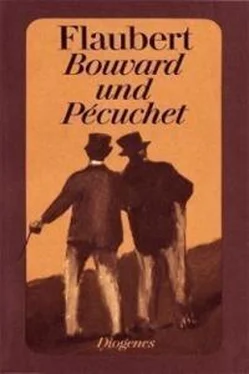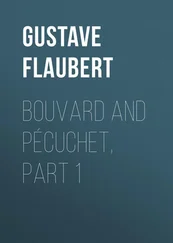Magic springs from this eternal yearning of the human mind. Its value has no doubt been exaggerated, but it is not a falsehood. Some Orientals who are skilled in it perform prodigies. All travellers have vouched for its existence, and at the Palais Royal M. Dupotet moves with his finger the magnetic needle.
How to become magicians? This idea appeared to them foolish at first, but it returned, tormented them, and they yielded to it, even while affecting to laugh.
A course of preparation is indispensable.
In order to excite themselves the better, they kept awake at night, fasted, and, wishing to convert Germaine into a more delicate medium, they limited her diet. She indemnified herself by drinking, and consumed so much brandy that she speedily ended in becoming intoxicated. Their promenades in the corridor awakened her. She confused the noise of their footsteps with the hummings in her ears and the voices which she imagined she heard coming from the walls. One day, when she had put a plaice into the pantry, she was frightened on seeing it covered with flame; she became worse than ever after that, and ended by believing that they had cast a spell over her.
Hoping to behold visions, they pressed the napes of each other's necks; they made themselves little bags of belladonna; finally they adopted the magic box, out of which rises a mushroom bristling with nails, to be worn over the heart by means of a ribbon attached to the breast. Everything proved unsuccessful. But they might make use of the sphere of Dupotet!
Pécuchet, with a piece of charcoal, traced on the ground a black shield, in order to enclose within its compass the animal spirits whose duty it is to assist the ambient spirits, and rejoicing at having the mastery over Bouvard, he said to him, with a pontifical air:
"I defy you to cross it!"
Bouvard viewed this circular space. Soon his heart began throbbing, his eyes became clouded.
"Ha! let us make an end of it!" And he jumped over it, to get rid of an inexpressible sense of unpleasantness.
Pécuchet, whose exultation was increasing, desired to make a corpse appear.
Under the Directory a man in the Rue de l'Échiquier exhibited the victims of the Terror. There are innumerable examples of persons coming back from the other world. Though it may be a mere appearance, what matter? The thing was to produce the effect.
The nearer to us we feel the phantom, the more promptly it responds to our appeal. But he had no relic of his family—ring, miniature, or lock of hair—while Bouvard was in a position to conjure up his father; but, as he testified a certain repugnance on the subject, Pécuchet asked him:
"What are you afraid of?"
"I? Oh! nothing at all! Do what you like."
They kept Chamberlan in their pay, and he supplied them by stealth with an old death's–head. A seamster cut out for them two long black robes with hoods attached, like monks' habits. The Falaise coach brought them a large parcel in a wrapper. Then they set about the work, the one interested in executing it, the other afraid to believe in it.
The museum was spread out like a catafalque. Three wax tapers burned at the side of the table pushed against the wall beneath the portrait of Père Bouvard, above which rose the death's–head. They had even stuffed a candle into the interior of the skull, and rays of light shot out through the two eyeholes.
In the centre, on a chafing–dish, incense was smoking. Bouvard kept in the background, and Pécuchet, turning his back to him, cast handfuls of sulphur into the fireplace.
Before invoking a corpse the consent of the demons is required. Now, this day being a Friday—a day which is assigned to Béchet—they should occupy themselves with Béchet first of all.
Bouvard, having bowed to the right and to the left, bent his chin, and raised his arms, began:
"In the names of Ethaniel, Anazin, Ischyros―"
He forgot the rest.
Pécuchet rapidly breathed forth the words, which had been jotted down on a piece of pasteboard:
"Ischyros, Athanatos, Adonaï, Sadaï, Eloy, Messiasös" (the litany was a long one), "I implore thee, I look to thee, I command thee, O Béchet!"
Then, lowering his voice:
"Where art thou, Béchet? Béchet! Béchet! Béchet!"
Bouvard sank into the armchair, and he was very pleased at not seeing Béchet, a certain instinct reproaching him with making an experiment which was a kind of sacrilege.
Where was his father's soul? Could it hear him? What if, all at once, it were about to appear?
The curtains slowly moved under the wind, which made its way in through a cracked pane of glass, and the wax–tapers caused shadows to oscillate above the corpse's skull and also above the painted face. An earthy colour made them equally brown. The cheek–bones were consumed by mouldiness, the eyes no longer possessed any lustre; but a flame shone above them in the eyeholes of the empty skull. It seemed sometimes to take the other's place, to rest on the collar of the frock–coat, to have a beard on it; and the canvas, half unfastened, swayed and palpitated.
Little by little they felt, as it were, the sensation of being touched by a breath, the approach of an impalpable being. Drops of sweat moistened Pécuchet's forehead, and Bouvard began to gnash his teeth: a cramp gripped his epigastrium; the floor, like a wave, seemed to flow under his heels; the sulphur burning in the chimney fell down in spirals. At the same moment bats flitted about. A cry arose. Who was it?
And their faces under their hoods presented such a distorted aspect that, gazing at each other, they were becoming more frightened than before, not venturing either to move or to speak, when behind the door they heard groans like those of a soul in torture.
At length they ran the risk. It was their old housekeeper, who, espying them through a slit in the partition, imagined she saw the devil, and, falling on her knees in the corridor, kept repeatedly making the sign of the Cross.
All reasoning was futile. She left them the same evening, having no desire to be employed by such people.
Germaine babbled. Chamberlan lost his place, and he formed against them a secret coalition, supported by the Abbé Jeufroy, Madame Bordin, and Foureau.
Their way of living, so unlike that of other people, gave offence. They became objects of suspicion, and even inspired a vague terror.
What destroyed them above all in public opinion was their choice of a servant. For want of another, they had taken Marcel.
His hare–lip, his hideousness, and the gibberish he talked made people avoid him. A deserted child, he had grown up, the sport of chance, in the fields, and from his long–continued privations he became possessed by an insatiable appetite. Animals that had died of disease, putrid bacon, a crushed dog—everything agreed with him so long as the piece was thick; and he was as gentle as a sheep, but utterly stupid.
Gratitude had driven him to offer himself as a servant to MM. Bouvard and Pécuchet; and then, believing that they were wizards, he hoped for extraordinary gains.
Soon after the first days of his employment with them, he confided to them a secret. On the heath of Poligny a man had formerly found an ingot of gold. The anecdote is related by the historians of Falaise; they were ignorant of its sequel: Twelve brothers, before setting out on a voyage, had concealed twelve similar ingots along the road from Chavignolles to Bretteville, and Marcel begged of his masters to begin a search for them over again. These ingots, said they to each other, had perhaps been buried just before emigration.
This was a case for the use of the divining–rod. Its virtues are doubtful. They studied the question, however, and learned that a certain Pierre Garnier gives scientific reasons to vindicate its claims: springs and metals throw out corpuscles which have an affinity with the wood.
Читать дальше








![Гюстав Флобер - Закат Карфагена [Сборник]](/books/414440/gyustav-flober-zakat-karfagena-sbornik-thumb.webp)


